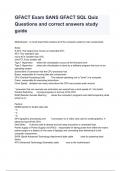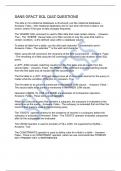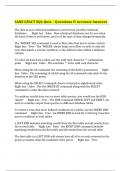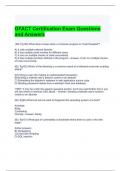Sans gfact sql - Study guides, Class notes & Summaries
Looking for the best study guides, study notes and summaries about Sans gfact sql? On this page you'll find 13 study documents about Sans gfact sql.
All 13 results
Sort by
GFACT Exam SANS GFACT SQL Quiz Questions and correct answers study guide
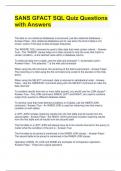
-
SANS GFACT SQL Quiz Questions with Answers
- Exam (elaborations) • 2 pages • 2024
-
Available in package deal
-
- $12.99
- + learn more
SANS GFACT SQL Quiz Questions with Answers The data in non-relational databases is structured, just like relational databases. - Answer-False - Non-relational databases are for use when the kind of data is not known, and/or if the type of data changes frequently. The 'WHERE' SQL command is used to filter data that meet certain criteria. - Answer-True - The `WHERE` clause helps us to filter records to only the ones that match a certain condition, defined value within a database column T...
SANS GFACT SQL QUIZ QUESTIONS
SANS GFACT SQL Quiz – Questions & Accurate Answers
SANS GFACT SQL Quiz Questions with correct Answers
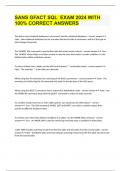
-
SANS GFACT SQL EXAM 2024 WITH 100% CORRECT ANSWERS
- Exam (elaborations) • 2 pages • 2024
-
- $16.49
- + learn more
The data in non-relational databases is structured, just like relational databases. - correct answer False - Non-relational databases are for use when the kind of data is not known, and/or if the type of data changes frequently. The 'WHERE' SQL command is used to filter data that meet certain criteria. - correct answer True - The `WHERE` clause helps us to filter records to only the ones that match a certain condition, defined value within a database column To select all data from a tab...
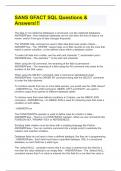
-
SANS GFACT SQL Questions & Answers!!!
- Exam (elaborations) • 2 pages • 2024
-
- $8.99
- + learn more
The data in non-relational databases is structured, just like relational databases. - ANSWERFalse - Non-relational databases are for use when the kind of data is not known, and/or if the type of data changes frequently. The 'WHERE' SQL command is used to filter data that meet certain criteria. - ANSWERTrue - The `WHERE` clause helps us to filter records to only the ones that match a certain condition, defined value within a database column
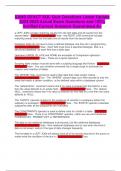
-
SANS GFACT SQL Quiz Questions Latest Update 2024-2025 Actual Exam Questions and 100% Verified Correct Answers Guaranteed A+
- Exam (elaborations) • 2 pages • 2024
-
Available in package deal
-
- $20.49
- + learn more
SANS GFACT SQL Quiz Questions Latest Update Actual Exam Questions and 100% Verified Correct Answers Guaranteed A+
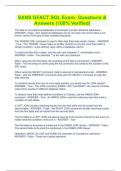
-
SANS GFACT SQL Exam- Questions & Answers (100% Verified)
- Exam (elaborations) • 2 pages • 2023
-
Available in package deal
-
- $4.99
- + learn more
SANS GFACT SQL Exam- Questions & Answers (100% Verified) SANS GFACT SQL Exam- Questions & Answers (100% Verified) The data in non-relational databases is structured, just like relational databases. - ANSWER - False - Non-relational databases are for use when the kind of data is not known, and/or if the type of data changes frequently. The 'WHERE' SQL command is used to filter data that meet certain criteria. - ANSWER - True - The `WHERE` clause helps us to filter records to only the one...
1 Exam (elaborations) SANS GFACT SQL Quiz Questions with correct Answers 2 Exam (elaborations) GFACT Certification Exam Questions and Answers 2024

How did he do that? By selling his study resources on Stuvia. Try it yourself! Discover all about earning on Stuvia

